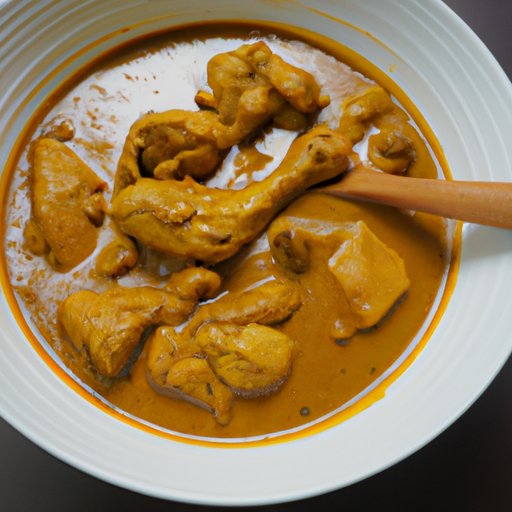Introduction
Chicken curry is a popular dish that is enjoyed by people around the world. It consists of cooked chicken, spices, and other ingredients such as onion, garlic, tomatoes, and coconut milk, which are all combined to create a flavorful and aromatic curry sauce. But what about the nutritional value of this dish? Is it healthy for you? In this article, we’ll explore the health benefits and risks of eating chicken curry and provide some tips for making it part of your diet in a healthy way.
Exploring the Nutritional Benefits of Chicken Curry
When it comes to nutrition, chicken curry can be a great source of vitamins, minerals, protein, carbohydrates, and fats. Here’s a closer look at each of these components:
Vitamins and Minerals Found in Chicken Curry
A single serving of chicken curry contains several essential vitamins and minerals, including vitamin A, vitamin C, calcium, magnesium, and potassium. Vitamin A is important for eye health, while vitamin C helps to support the immune system. Calcium, magnesium, and potassium are all essential for maintaining healthy bones, muscles, and nerves.
Protein Content of Chicken Curry
Chicken curry is also a good source of protein. One serving of chicken curry typically contains up to 20 grams of protein, which is an important nutrient for building muscle, repairing tissues, and providing energy.
Carbohydrates and Fats Found in Chicken Curry
When it comes to carbohydrates and fats, chicken curry is relatively low in both. A single serving typically contains just 8-10 grams of carbohydrates, as well as 5-10 grams of fat. The majority of the fat in chicken curry comes from healthy sources such as olive oil and coconut milk, so it’s not likely to have a negative impact on your health.

A Comprehensive Look at the Health Effects of Eating Chicken Curry
Now that we’ve explored the nutritional benefits of chicken curry, let’s take a closer look at the potential health effects of eating this dish.
Potential Benefits of Eating Chicken Curry
Eating chicken curry may offer a range of potential health benefits. For example, the protein in chicken curry may help to build and repair muscle, while the vitamins and minerals can support a healthy immune system and overall health. Additionally, the moderate amount of fat in chicken curry may help to keep you feeling full and satisfied after eating.
Potential Risks of Eating Chicken Curry
While there are some potential benefits to eating chicken curry, there are also some potential risks. For instance, if the dish is made with too much oil or butter, it could be high in saturated fat, which can increase your risk of heart disease. Additionally, if the dish is made with processed meats or canned vegetables, it may contain high levels of sodium, which can contribute to high blood pressure.
What Does Science Say About Eating Chicken Curry?
When it comes to the health effects of eating chicken curry, there has been some scientific research conducted on the subject. Here’s a look at the findings of two studies:
Studies on the Health Benefits of Eating Chicken Curry
A 2019 study published in the journal Nutrients found that Indian dishes, including chicken curry, are “rich in phytonutrients and antioxidants, which have been linked to a variety of health benefits.” The study also noted that Indian dishes are “generally low in fat and sugar, making them an excellent choice for those looking to maintain a healthy weight.”
Studies on the Health Risks of Eating Chicken Curry
A 2020 study published in the journal Food & Nutrition Research found that “overconsumption of sodium, saturated fat, and cholesterol can lead to adverse health outcomes.” The study concluded that when preparing chicken curry, “cooks should be mindful of the use of oil and other condiments, as these can add significant amounts of sodium, fat, and cholesterol to the dish.”
Is Chicken Curry a Healthy Choice for You?
Now that we’ve explored the potential benefits and risks of eating chicken curry, let’s take a look at whether or not it’s a healthy choice for you.
Weighing the Pros and Cons
When it comes to deciding whether or not chicken curry is a healthy choice for you, it’s important to weigh the pros and cons. On the one hand, chicken curry is a good source of protein, vitamins, and minerals, and can be a great option for those looking to maintain a healthy weight. On the other hand, it can be high in saturated fat and sodium if not prepared properly, so it’s important to be mindful of the ingredients used.
Making an Informed Decision
Ultimately, the decision of whether or not to include chicken curry in your diet is a personal one. If you do choose to eat chicken curry, it’s important to make sure that you’re choosing lean cuts of meat, using healthy cooking methods (such as grilling or baking), and avoiding ingredients that are high in fat, sodium, and cholesterol. This will help ensure that you’re getting the most nutritional benefit from your meal.

The Pros and Cons of Making Chicken Curry Part of Your Diet
Now that we’ve explored the potential health benefits and risks of eating chicken curry, let’s take a look at the pros and cons of making it part of your diet.
Advantages of Eating Chicken Curry
One of the biggest advantages of eating chicken curry is that it’s a good source of protein, vitamins, and minerals. Additionally, it can be prepared in a variety of ways, making it a great option for those who are trying to maintain a healthy weight. Finally, it’s an affordable and delicious meal that can be enjoyed by the whole family.
Disadvantages of Eating Chicken Curry
On the downside, chicken curry can be high in calories and fat if not prepared properly. Additionally, it can be high in sodium if it’s made with processed meats or canned vegetables. Finally, it can be difficult to find healthy recipes for chicken curry that don’t rely on unhealthy ingredients.
Can Eating Chicken Curry Help You Reach Your Health Goals?
If you’re looking to reach your health goals, eating chicken curry can be a great way to do so. Here are some tips for maintaining optimal nutrition with chicken curry:
How to Eat Chicken Curry in a Healthy Way
When preparing chicken curry, it’s important to choose lean cuts of meat, use healthy cooking methods (such as grilling or baking), and avoid ingredients that are high in fat, sodium, and cholesterol. Additionally, it’s best to opt for recipes that include plenty of fresh vegetables, as they are packed with vitamins, minerals, and fiber.
Tips for Maintaining Optimal Nutrition with Chicken Curry
In addition to choosing healthy ingredients and cooking methods, here are some other tips for maintaining optimal nutrition with chicken curry:
- Opt for brown rice instead of white rice, as it is higher in fiber and other nutrients.
- Choose low-fat yogurt or coconut milk instead of cream or butter.
- Add fresh herbs and spices for flavor, instead of relying on processed sauces.
- Serve chicken curry with a side of steamed vegetables for added nutrition.
Conclusion
In conclusion, chicken curry can be a healthy choice if it’s prepared properly. It’s a good source of protein, vitamins, and minerals, and can be a great option for those looking to maintain a healthy weight. However, it can also be high in fat and sodium if not prepared properly, so it’s important to be mindful of the ingredients used. Ultimately, the decision of whether or not to include chicken curry in your diet is a personal one, but if you do choose to eat it, it’s important to make sure that you’re doing so in a healthy way.
(Note: Is this article not meeting your expectations? Do you have knowledge or insights to share? Unlock new opportunities and expand your reach by joining our authors team. Click Registration to join us and share your expertise with our readers.)
